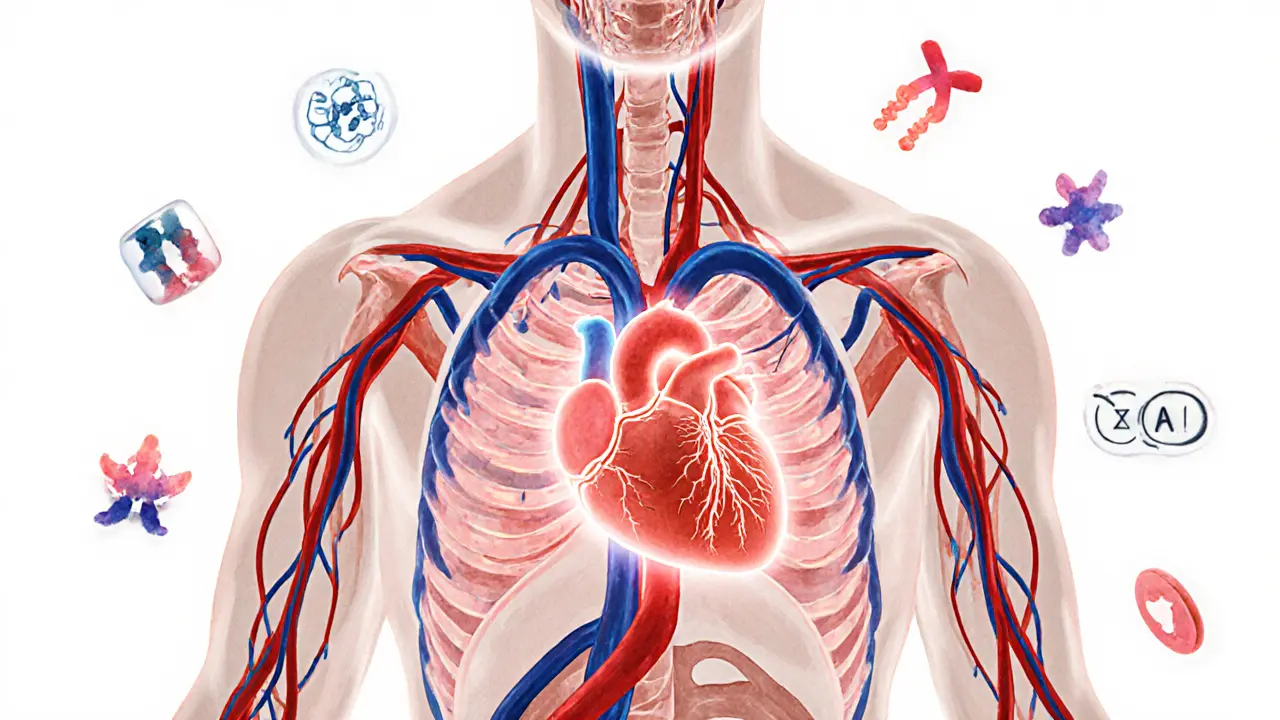Many people think of sex as just a physical act-or something tied to romance or pleasure. But regular classic vaginal sex does more than satisfy desire. It’s one of the most natural, accessible, and underappreciated forms of preventive health care. If you’re having sex regularly with a trusted partner, your body is getting real, measurable benefits-from your heart to your brain to your immune system.
Your Heart Gets a Workout
Think of classic vaginal sex as a moderate-intensity cardio session. On average, it burns about 3 to 5 calories per minute, depending on intensity and duration. That’s similar to a brisk walk or light cycling. But unlike a treadmill, sex also raises your heart rate and improves circulation. A 2022 study from the American Heart Association found that men who had sex at least twice a week were 45% less likely to develop cardiovascular disease than those who had sex less than once a month. The same pattern holds for women, even after adjusting for age, smoking, and physical activity levels.
Why? Sex triggers the release of nitric oxide, which helps relax blood vessels and lower blood pressure. Over time, this reduces strain on your heart. It’s not a replacement for exercise, but it’s a consistent, enjoyable way to keep your cardiovascular system in good shape.
Stress and Anxiety Drop Fast
Ever notice how you feel calmer after sex? That’s not just in your head. During orgasm, your brain floods with oxytocin-often called the “cuddle hormone”-and endorphins. These chemicals lower cortisol, the main stress hormone. One 2023 study from the University of Duisburg-Essen tracked 100 couples over six months. Those who had vaginal sex at least three times a week reported 30% lower stress levels and better sleep quality than those who had less frequent sex.
It’s not just the physical release. The emotional connection during sex-eye contact, touch, breathing together-activates the parasympathetic nervous system. That’s the part of your body that says, “You’re safe now.” For people dealing with anxiety or burnout, this isn’t a luxury. It’s a reset button.
Your Immune System Gets Stronger
Here’s one you might not expect: regular vaginal sex can boost your immune system. Researchers at Wilkes University in Pennsylvania measured immunoglobulin A (IgA) levels in college students. IgA is your body’s first line of defense against colds and infections. Students who had sex once or twice a week had 30% higher IgA levels than those who were abstinent or had sex less than once a month.
The effect doesn’t come from sperm or vaginal fluids alone. It’s tied to the rhythm of regular intimacy. When sex becomes part of your routine, your body adapts by maintaining a stronger baseline immune response. That doesn’t mean you’ll never get sick-but you’ll likely get sick less often and recover faster.

Pain Relief That Lasts
Sex is a natural painkiller. Endorphins released during orgasm act like your body’s own morphine. Studies show that vaginal sex can reduce the intensity of headaches, arthritis pain, and even menstrual cramps. One small clinical trial in 2021 had 100 women with chronic pelvic pain. After six weeks of regular vaginal sex (at least twice a week), 72% reported a 40% or greater drop in pain levels. The effect was strongest when sex was consensual, relaxed, and not pressured.
It’s not magic. It’s biology. The same neural pathways that process pleasure also dampen pain signals. That’s why a good orgasm can make a toothache feel distant for hours.
Better Sleep, No Pills Needed
If you’ve ever struggled to fall asleep, you know how frustrating it is. Many turn to sleep aids or alcohol-both come with downsides. But sex offers a natural alternative. After orgasm, your body releases prolactin, a hormone that triggers drowsiness. Combined with the drop in cortisol and the physical exhaustion of movement, sex makes it easier to fall asleep faster and stay asleep longer.
A 2024 sleep study from the University of Michigan found that people who had vaginal sex before bed fell asleep 15 minutes faster on average than those who didn’t. They also spent more time in deep sleep stages. The key? Timing. Sex within an hour of bedtime works best. Too early, and you’re too alert. Too late, and you’re too wired.
Mental Health and Emotional Connection
Sex isn’t just about the body. It’s about connection. Regular vaginal sex, especially in a committed relationship, strengthens emotional bonds. It builds trust, reduces feelings of loneliness, and increases relationship satisfaction. A 2023 longitudinal study from the University of Toronto followed 2,000 adults over five years. Those who had regular sex reported higher levels of life satisfaction-even more than those with higher incomes or better jobs.
It’s not about frequency alone. It’s about consistency. Even if it’s just 10 minutes, if it happens reliably, your brain starts to associate it with safety and belonging. That’s powerful for mental health, especially in a world where isolation is rising.

What Counts as “Regular”?
There’s no universal rule. Some people thrive on daily sex. Others feel great with once a week. But research shows that the benefits start to show up at around two to three times a week. That’s the sweet spot for immune boost, stress reduction, and cardiovascular support.
Don’t compare yourself to porn or social media. Real life isn’t about performance. It’s about presence. If you’re relaxed, connected, and enjoying the moment, your body gets the benefit-even if it’s slow, quiet, or ends in laughter.
When It Doesn’t Help
Sex isn’t a cure-all. If you’re having sex out of obligation, guilt, or pressure, the benefits disappear. Stress from forced intimacy can actually raise cortisol and hurt your health. Same goes for sex that’s painful, unsafe, or emotionally draining.
Also, if you have a medical condition-like heart disease, severe pelvic pain, or an infection-talk to your doctor first. Sex should never hurt. If it does, something’s wrong. Don’t push through pain. Get help.
It’s Not Just About Penetration
Classic vaginal sex often gets framed as the only “real” kind. But the health benefits come from the full experience: touching, kissing, breathing together, eye contact, closeness. Foreplay matters. Communication matters. Aftercare matters. The orgasm is the peak-but the whole journey is what heals.
If you’re not ready for penetration, that’s fine. Hugging, cuddling, or mutual masturbation can still trigger oxytocin and endorphins. The goal isn’t to check a box. It’s to feel connected, safe, and alive.
Sex is one of the few things that simultaneously improves your physical, mental, and emotional health-without a prescription, a gym membership, or a subscription fee. It’s free, natural, and deeply human. You don’t need to be young, fit, or perfect to benefit from it. Just present. Just willing. Just connected.
Can regular vaginal sex improve my immune system?
Yes. Studies show that people who have vaginal sex once or twice a week have higher levels of immunoglobulin A (IgA), an antibody that helps fight off colds and infections. This effect is linked to regular, consensual sexual activity-not just the act itself, but the routine and emotional safety it brings.
Does sex help with anxiety and depression?
For many people, yes. Sex releases oxytocin and endorphins, which reduce stress hormones like cortisol. Regular, pleasurable sex has been linked to lower anxiety levels and improved mood. But it’s not a substitute for therapy or medication if you’re dealing with clinical depression or severe anxiety. It’s a supportive tool, not a cure.
How often should I have sex to get health benefits?
Research suggests that two to three times a week is the sweet spot for measurable health benefits-like lower blood pressure, stronger immunity, and better sleep. But even once a week can help. What matters most is consistency and emotional comfort, not quantity.
Can sex relieve chronic pain?
Yes. Orgasms trigger the release of endorphins, which act as natural painkillers. Studies have shown relief from headaches, arthritis, and menstrual cramps after regular sex. One study found that 72% of women with chronic pelvic pain saw a 40% reduction in symptoms after consistent, comfortable sexual activity.
Is it safe to have sex if I have a heart condition?
For most people with stable heart conditions, sex is safe and even beneficial. But if you’ve recently had a heart attack, surgery, or experience chest pain during activity, talk to your doctor first. They can help you determine what’s safe based on your specific condition.




